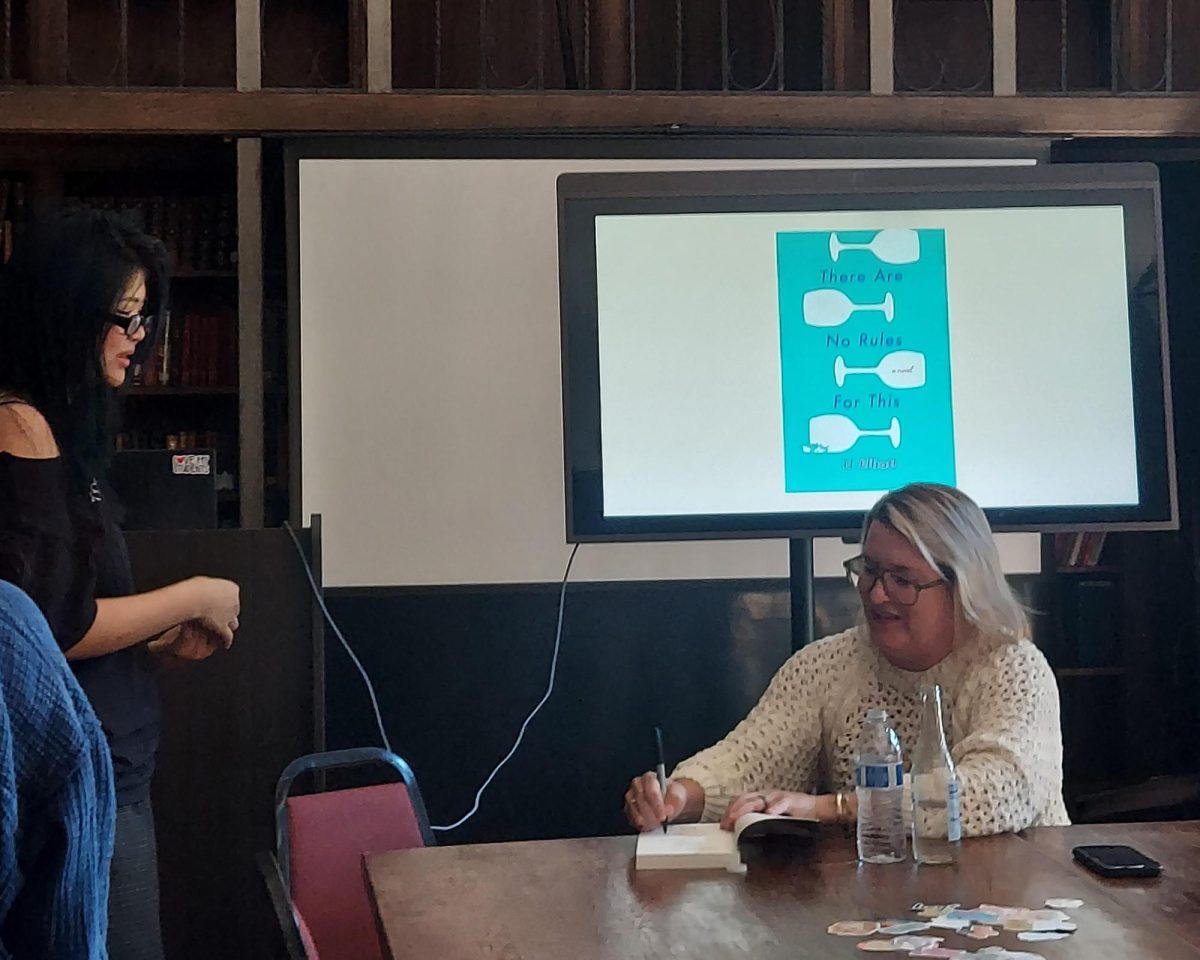
Author JJ Elliot signs copies of "There Are No Rules for This". During Women's Group Meeting in the Otto Library. // Photo Provided by Ms. Carino Peterson
Award-winning novelist JJ Elliott visited SHP’s Women’s Group for a Book Talk on Sept. 26, sharing how her debut work, There Are No Rules For This, grew from sudden inspiration to a story that has touched lives. The event provided listeners the opportunity to hear firsthand about Elliott’s creative process, the thematic heart of her work, and her reflections on the transformative power of storytelling. The conversation, moderated by members of the Women’s Group, drew out the book’s central themes while also weaving in anecdotes from Elliott’s own journey as a writer. “Bringing this event together felt like the perfect way to connect our mission of fostering female friendship with the perspective of such an inspiring voice from our community,” said Lucy Irvine ‘27, Women’s Group Primary Leader.
There Are No Rules For This has been widely celebrated as a moving meditation on the importance of women’s friendships. Through its exploration of grief, reconciliation, and mental health, the book invites readers to consider how relationships sustain us in the most difficult moments of life. The book follows Ali, Max, and Liddy, three longtime friends navigating the aftermath of their friend Feeney Simms’s unexpected death by suicide. After attending a distant and impersonal funeral arranged by Feeney’s mother, the three friends decide to hold their own “living funerals,” celebrations of one another while still alive, in the spirit of their late friend. The novel specifically focuses on the deep bonds among women as a force for resilience, emphasizing its place as “an ode to female friendships,” Elliott said.
One particularly striking story of the novel strengthening bonds between women involved a reader who approached Elliott to say that the novel had brought her back into contact with her estranged daughter. For Elliot, such moments confirmed her belief that “books have medicine in them”—that literature can bridge divides and offer healing in ways that ordinary conversation sometimes cannot.
Another recurring motif in both her novel and her talk was the concept of the “living funeral.” Elliott described these occasions, as they happen in her novel, as gatherings where people share words of love and gratitude with those still alive, rather than waiting until death has made it impossible for loved ones to experience these tributes. “It’s depressing that we have to wait until people die to say all the things we love about them,” she said, reflecting on how this idea shaped the emotional core of her story.
The talk with Elliott also provided a window into the realities of the writing process. Elliott explained that the entire concept for the novel arrived in a sudden moment of inspiration, echoing Elizabeth Gilbert’s notion in Big Magic that creative ideas are “in the air,” waiting to be caught by those who remain open to them. At first, she confided, she doubted her ability to see the project through and only told her husband about the novel after she had already written thirty pages. Yet from that point forward, she found herself propelled by both discipline and unexpected bursts of inspiration.
“Certain scenes flowed out of me as if I were channeling them,” she recalled, describing how her characters became so real that they seemed to act on their own. Yet the process was not without difficulty; she struggled with alternating moments of momentum and paralysis. “There were brilliant moments and then stuck moments,” she shared, “but when it all comes together, it feels like a miracle.” Elliott also spoke candidly about her writing habits, emphasizing the need to step outside the distractions of her home life in order to focus. She often writes in San Francisco cafés and credits writer’s retreats, especially the Kauai Writers Conference, with providing her with a community of support that encouraged her to continue. Along the way, she said, she felt she was “picking up breadcrumbs that the universe put down.”
The discussion touched briefly on the book’s striking cover. Initially dissatisfied with the photographic designs presented by her publisher, Elliott pushed for a more graphic approach that better reflected the story’s themes. She noted that many authors are given little or no say in how their work is packaged, and expressed gratitude for having been able to advocate for her vision.
Throughout the conversation, Elliott returned to a larger message for aspiring writers and listeners alike: the importance of sharing one’s voice. “Put your voice into the world,” she urged, “because somebody needs to hear it.”